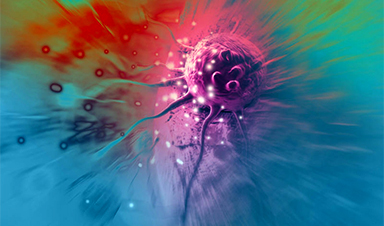Machine-learning algorithms tuned to detecting cancer DNA in the blood could pave the way for personalized cancer care.
copyright by www.the-scientist.com
Modern cancer medicine is hampered by two big challenges—detecting cancers when they are small and offering cancer patients personalized, dynamic cancer care. To find solutions, several academic labs and biotech firms are turning to artificial intelligence, working to develop machine-learning algorithms that could help decipher weak signals in the blood that can identify cancers at an early stage and indicate whether a cancer is responding to treatment in real time.
“You have to find this needle in a haystack . . . this very weak signal amongst all of the cacophony of everything else happening in the body,” says Dave Issadore , a bioengineer at Pennsylvania State University and founder of Chip Diagnostics, which is developing a machine-learning method to diagnose disease by sequencing extracellular vesicles’ cargo.
So far, machine-learning algorithms designed to detect minute quantities of tumor DNA in a blood sample—the goal of so-called liquid biopsies—have performed well in clinical validation studies, but no self-learning algorithm has yet been approved for clinical use. These have the potential to outperform imaging and tissue biopsies in detecting and monitoring cancers by looking for mutations in DNA, RNA, and proteins directly from the blood.
“I think the dream of liquid biopsy is to, A), detect cancer when there is very little of it, and, B) detect cancers during treatment,” says Dan Landau, a clinical oncologist and researcher at Weill Cornell Medical School in New York. However, in the both contexts, liquid biopsy techniques struggle to accurately detect cancer among the infinitesimally small quantities of tumor nucleic acids in the blood. Although the technique’s performance varies between cancer types, liquid biopsies so far have been able to detect cancer in around half of early-stage patients diagnosed through imaging, giving it a sensitivity of just 50 percent.
Image Credit: The Scientist
News This Week
Sleep Deprivation Triggers a Strange Brain Cleanup
When you don’t sleep enough, your brain may clean itself at the exact moment you need it to think. Most people recognize the sensation. After a night of inadequate sleep, staying focused becomes harder [...]
Lab-grown corticospinal neurons offer new models for ALS and spinal injuries
Researchers have developed a way to grow a highly specialized subset of brain nerve cells that are involved in motor neuron disease and damaged in spinal injuries. Their study, published today in eLife as the final [...]
Urgent warning over deadly ‘brain swelling’ virus amid fears it could spread globally
Airports across Asia have been put on high alert after India confirmed two cases of the deadly Nipah virus in the state of West Bengal over the past month. Thailand, Nepal and Vietnam are among the [...]
This Vaccine Stops Bird Flu Before It Reaches the Lungs
A new nasal spray vaccine could stop bird flu at the door — blocking infection, reducing spread, and helping head off the next pandemic. Since first appearing in the United States in 2014, H5N1 [...]
These two viruses may become the next public health threats, scientists say
Two emerging pathogens with animal origins—influenza D virus and canine coronavirus—have so far been quietly flying under the radar, but researchers warn conditions are ripe for the viruses to spread more widely among humans. [...]
COVID-19 viral fragments shown to target and kill specific immune cells
COVID-19 viral fragments shown to target and kill specific immune cells in UCLA-led study Clues about extreme cases and omicron’s effects come from a cross-disciplinary international research team New research shows that after the [...]
Smaller Than a Grain of Salt: Engineers Create the World’s Tiniest Wireless Brain Implant
A salt-grain-sized neural implant can record and transmit brain activity wirelessly for extended periods. Researchers at Cornell University, working with collaborators, have created an extremely small neural implant that can sit on a grain of [...]
Scientists Develop a New Way To See Inside the Human Body Using 3D Color Imaging
A newly developed imaging method blends ultrasound and photoacoustics to capture both tissue structure and blood-vessel function in 3D. By blending two powerful imaging methods, researchers from Caltech and USC have developed a new way to [...]














Leave A Comment